* You are viewing the archive for January, 2012
James Brown
January 30, 2012
Events, Front Page, Project Updates, Videos
Tags: CKCC, Databases, Digitization, Geography, Mapping the Republic of Letters, Networks, Spatial Theory, Union Catalogue, Union Catalogue News, Visualization

Videos of twenty-one papers and keynotes from our 2011 conference Intellectual Geography: Comparative Studies, 1550-1700 (Oxford, 5-7 September 2011) are now available on the conference website or via our Vimeo channel (with more hopefully to come). Organised by Howard Hotson, the event introduced and tested the novel concept of ‘intellectual geography’ as a means of appreciating and understanding the organisation of intellectual activity and the dissemination of ideas within space and across time, from the sixteenth to the eighteenth centuries. A taster – Miles Ogborn‘s keynote exploration of ‘What is Intellectual Geography?’ – is provided below. Happy viewing!
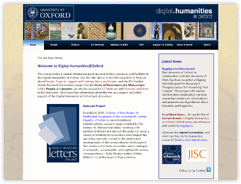 We were this week’s featured project on Digital.Humanities@Oxford, meaning a coveted front-page slot for a brief description of Cultures of Knowledge and the logo for our union catalogue, Early Modern Letters Online. Recently given a facelift and some important new functionality, DH@O is a central hub for information about relevant activities, resources, and activities in Oxford – one of the most established centres of digital humanities in the world – and features a growing relational database of people and projects involved.
We were this week’s featured project on Digital.Humanities@Oxford, meaning a coveted front-page slot for a brief description of Cultures of Knowledge and the logo for our union catalogue, Early Modern Letters Online. Recently given a facelift and some important new functionality, DH@O is a central hub for information about relevant activities, resources, and activities in Oxford – one of the most established centres of digital humanities in the world – and features a growing relational database of people and projects involved.
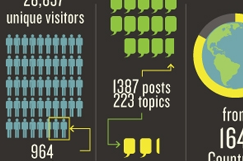
Detail from the graphic.
Melissa Terras from the UCL Centre for Digital Humanities has, with the support of the UCLCDH, created a wonderful infographic of this exciting field. While not completely comprehensive, the visualization combines data from a wide variety of online sources across a range of measurable criteria, and is definitely worth a look. The infographic is available via the UCLCDH Flickr Stream or as a print download (pdf).
Elsevier, a world-leading provider of scientific, technical, and medical information products and services, and the Scaliger Institute of Leiden University Libraries have announced the founding of a three-year fellowship program to enable international rare books scholars to study century scientific scholarship and publishing in the early modern period. The program will support two scholars to work with the extensive Leiden University Special Collections and the Elsevier Heritage Collection – recently catalogued online – for a period of one to three months annually. They will also be invited to share their research through public lectures and publications. The closing date for applications is 1 March 2012. For further information and the application form please visit the websites of Elsevier or the Scaliger Institute. Please address queries to scaliger@library(at)leidenuniv.nl.
James Brown
January 11, 2012
Conferences and Workshops, Events, Project Updates
Tags: Animals, Arachnology, Conchology, History of Science, Martin Lister, Natural History, Royal Society, Seventeenth Century
Update: see write-up, photos, and podcasts
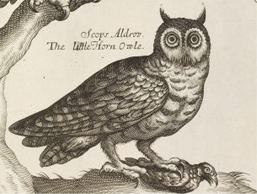
A seventeenth-century rendering of a little horn (or screech) owl.
A day conference on History Comes to Life: Seventeenth-Century Natural History, Medicine and the New Science‚ will be held on Friday 27 April 2012 from 9am to 5.30pm at The Royal Society in London. Organised by our industrious Martin Lister (1639-1712) Research Fellow Anna Marie Roos, and held to commemorate the 300th anniversary of Lister – Royal Physician and the first arachnologist and conchologist – the event will explore the often neglected relationship between medicine and natural history in the seventeenth-century. Featuring an exciting line-up of ten international authorities on early modern science, the meeting will dovetail out from Lister’s work to consider to what extent practices and technologies of natural history changed between the Renaissance and the seventeenth century. It will also explore how the acquisition of natural history knowledge and new schemes of taxonomy influenced the perception and treatment of animals for medical and experimental use. As well as support from Cultures of Knowledge, the conference is sponsored by The John Fell Fund, The British Society for the History of Science, The Royal Society, and the Wellcome Trust. The conference fee is a bargain at £40 (full price) or £30 (student/unwaged). For further details and to register online, please visit the conference webpage. Please address queries to felicity.henderson(at)royalsociety.org.
In exciting news for scholars of the Moravian educator and CofK stalwart Jan Amos Comenius, two Comenius-related publications prepared by colleagues and partners at the Czech Academy of Sciences have recently been released:
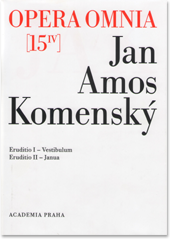 The new volume of J. A. Comenii Opera Omnia, 15/IV, appeared with Academia (Prague) in November 2011. Prepared by Martin Steiner, Markéta Klosová, and others, the volume builds on three installments already published under 15 and continues the ongoing work of the Opera Didactia Omnia corpus. The edition encompasses a significant part of Comenius’s activities in Hungary, including complete versions of textbooks prepared for the first two classes of his Latin school, and includes a full editorial apparatus as well as notes, comments, and summaries of information on edited works already available in English. For further information and to order a copy, please visit the publisher’s website.
The new volume of J. A. Comenii Opera Omnia, 15/IV, appeared with Academia (Prague) in November 2011. Prepared by Martin Steiner, Markéta Klosová, and others, the volume builds on three installments already published under 15 and continues the ongoing work of the Opera Didactia Omnia corpus. The edition encompasses a significant part of Comenius’s activities in Hungary, including complete versions of textbooks prepared for the first two classes of his Latin school, and includes a full editorial apparatus as well as notes, comments, and summaries of information on edited works already available in English. For further information and to order a copy, please visit the publisher’s website.
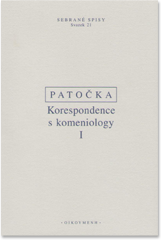 The letters of Jan Patočka, prepared by Věra Schifferová, have also been released in two volumes (1931-77) by Oikoymenh. A leading Czech philosopher of the twentieth century, Patočka was an eminent interpreter of Comenius’s life and work who corresponded extensively with other students of the pedagogue worldwide such as Milada Blekastad, Stanislav Sousedík, Julie Nováková, Jiřina Popelová, Josef Brambora, Antonín Škarka, Dmytro Čyževskyj, Klaus Schaller, Marcelle Denis, Franz Hofmann, and George Henry Turnbull. The letters, published in Czech, shed important light on Comenius as well as on the evolution of scholarly attitudes towards him. For further information and to order a copy, please visit the publisher’s website.
The letters of Jan Patočka, prepared by Věra Schifferová, have also been released in two volumes (1931-77) by Oikoymenh. A leading Czech philosopher of the twentieth century, Patočka was an eminent interpreter of Comenius’s life and work who corresponded extensively with other students of the pedagogue worldwide such as Milada Blekastad, Stanislav Sousedík, Julie Nováková, Jiřina Popelová, Josef Brambora, Antonín Škarka, Dmytro Čyževskyj, Klaus Schaller, Marcelle Denis, Franz Hofmann, and George Henry Turnbull. The letters, published in Czech, shed important light on Comenius as well as on the evolution of scholarly attitudes towards him. For further information and to order a copy, please visit the publisher’s website.








 Join
Join 